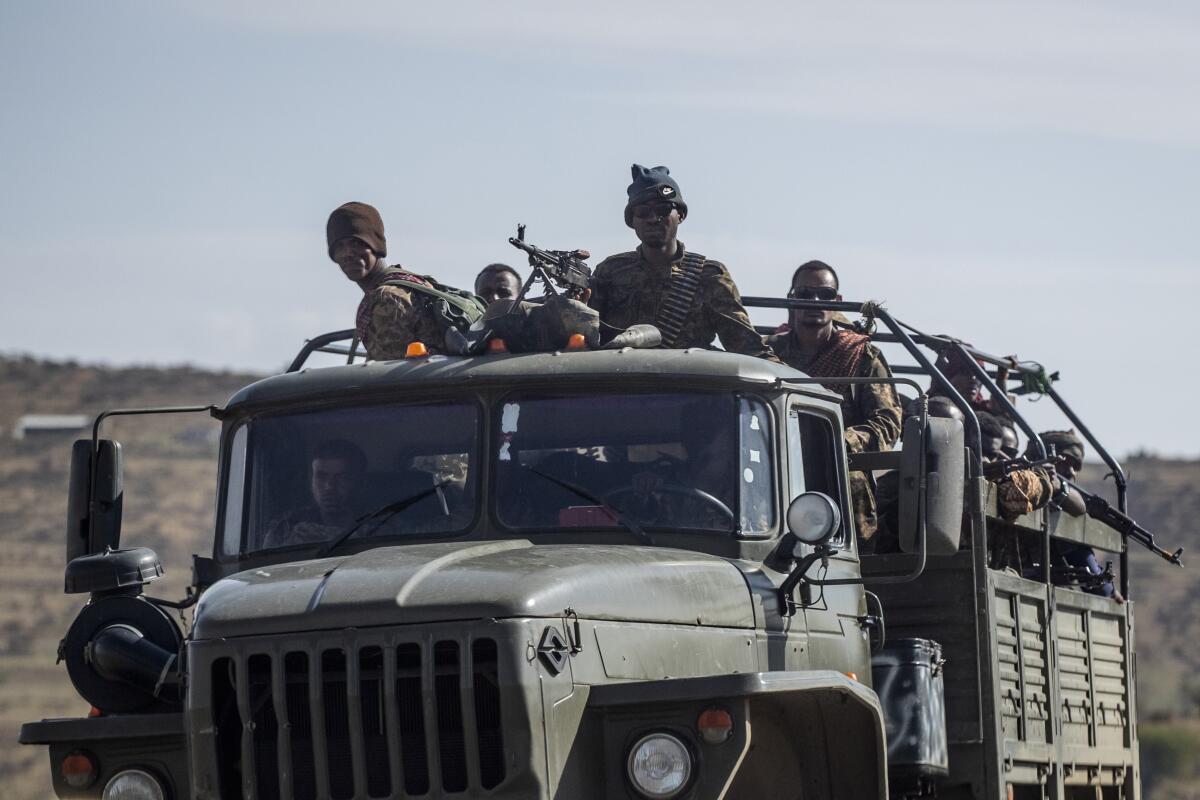‘Large-scale’ fighting shatters lull in Ethiopia’s Tigray region

- Share via
NAIROBI, Kenya — Ethiopia’s military has launched a “large-scale” offensive for the first time in a year in the country’s northern Tigray region, Tigray authorities alleged Wednesday, while the government countered that Tigray forces attacked first.
The renewed conflict is a significant setback to mediation efforts and the work to reach millions of people starved of food and other needs.
The claims followed months of regrouping by one of Africa’s largest militaries. Ethiopia’s military this week warned the public against any reporting of troop movements. Journalists haven’t been allowed into Tigray for more than a year.
The Tigray conflict began in November 2020, killing thousands of people in Africa’s second-most populous country. Now, as then, both sides have acted at a moment when the world was focused elsewhere — the U.S. presidential election in 2020 and the six-month mark of the Ukraine war Wednesday.
The Tigray conflict had calmed in recent months amid slow-moving mediation efforts. But last week, the spokeswoman for Prime Minister Abiy Ahmed asserted to journalists that Tigray authorities were “refusing to accept peace talks.”
A letter signed by Tigray leader Debretsion Gebremichael on Tuesday and shared with the Associated Press says Tigray leaders had “conducted two rounds of confidential face-to-face talks with senior military and civilian officials,” the first confirmation of direct negotiations. But the letter says “unacceptable conditions have been inserted into the peace process,” and it urges the international community to step in quickly.
The Tigray military command’s statement Wednesday said Ethiopian forces, along with Amhara special forces and Amhara militias, “have started a large-scale attack around 5 a.m. in the direction of Alamata, southern Tigray.” Tigray forces spokesman Getachew Reda tweeted that the offensive followed a “weeklong provocation” by forces in the neighboring Amhara region.
Ethiopian military spokesman Getnet Adane didn’t respond to questions. The government’s communication service in a statement asserted that the Tigray forces launched attacks Wednesday morning. It said that if attacks continue, “the government will take measures to save the country ... and also bring [Tigray forces] to the negotiating table whether it likes it or not.”
Ethiopia’s government has said it’s ready for talks, but insists the African Union must lead mediation efforts. Tigray authorities have criticized the continental body’s efforts and urgently sought the resumption of telephone, banking and other services that have been largely cut off since the war began.
Earlier this month, World Health Organization Director-General Tedros Adhanom Ghebreyesus, an ethnic Tigrayan, described the crisis in Tigray as “the worst disaster on Earth” and wondered aloud if the reason global leaders have not responded was due to “the color of the skin of the people in Tigray.”
Humanitarian aid began flowing to Tigray earlier this year, but a report by the World Food Program last week said that with little fuel allowed into the region to deliver supplies, “this is yet to translate into increased humanitarian assistance.” The U.N. agency said “rates of malnutrition have skyrocketed,” with 29% of children malnourished and 2.4 million people severely food insecure.
United Nations Secretary-General Antonio Guterres told journalists Wednesday he was “deeply shocked and saddened by the news of the resumption of hostilities” and called for an immediate cease-fire and resumption of talks along with “the full guarantee of humanitarian access to people in need and the reestablishment of public services.”
The conflict also has created a humanitarian crisis for millions of people affected by the fighting in the Amhara and neighboring Afar regions, while thousands of Tigrayans now live in refugee camps in Sudan.
The AU envoy, former Nigerian President Olesegun Obasanjo, and his spokesman didn’t respond to questions Wednesday and have said little about mediation efforts.
The new fighting comes as the president of neighboring Kenya, who has tried to mediate with U.S. support, to Ethiopia’s annoyance, prepares to leave office.
“This is one of the most important and brutal conflicts on Earth,” U.S. Sen. Chris Coons (D-Del.), a member of the Senate Foreign Relations Committee, told journalists Wednesday after completing a five-country Africa visit during which he discussed Ethiopia with the presidents of Kenya and Rwanda.
“I actually had left Africa two days ago somewhat optimistic about the path forward for mediation, so [the renewed fighting] is very disheartening to hear,” he said.
Coons visited Ethiopia last year as an envoy of President Biden. “I have been very disappointed that Prime Minister Abiy has not made more progress in meeting the commitments he made, and deeply frustrated that the improvements in terms of humanitarian access and [reductions in] some of the press and information limitations have moved as slowly as they have,” Coons said.
The renewed fighting is a “deafening warning to the key international and regional actors that they must immediately ensure peace talks actually occur,” said analyst William Davison of the International Crisis Group. “They should accordingly instruct the belligerents to issue all of their demands when at the negotiating table, rather than making them preconditions for talks.”
Associated Press writer Edith M. Lederer at the United Nations contributed to this report.
More to Read
Sign up for Essential California
The most important California stories and recommendations in your inbox every morning.
You may occasionally receive promotional content from the Los Angeles Times.










